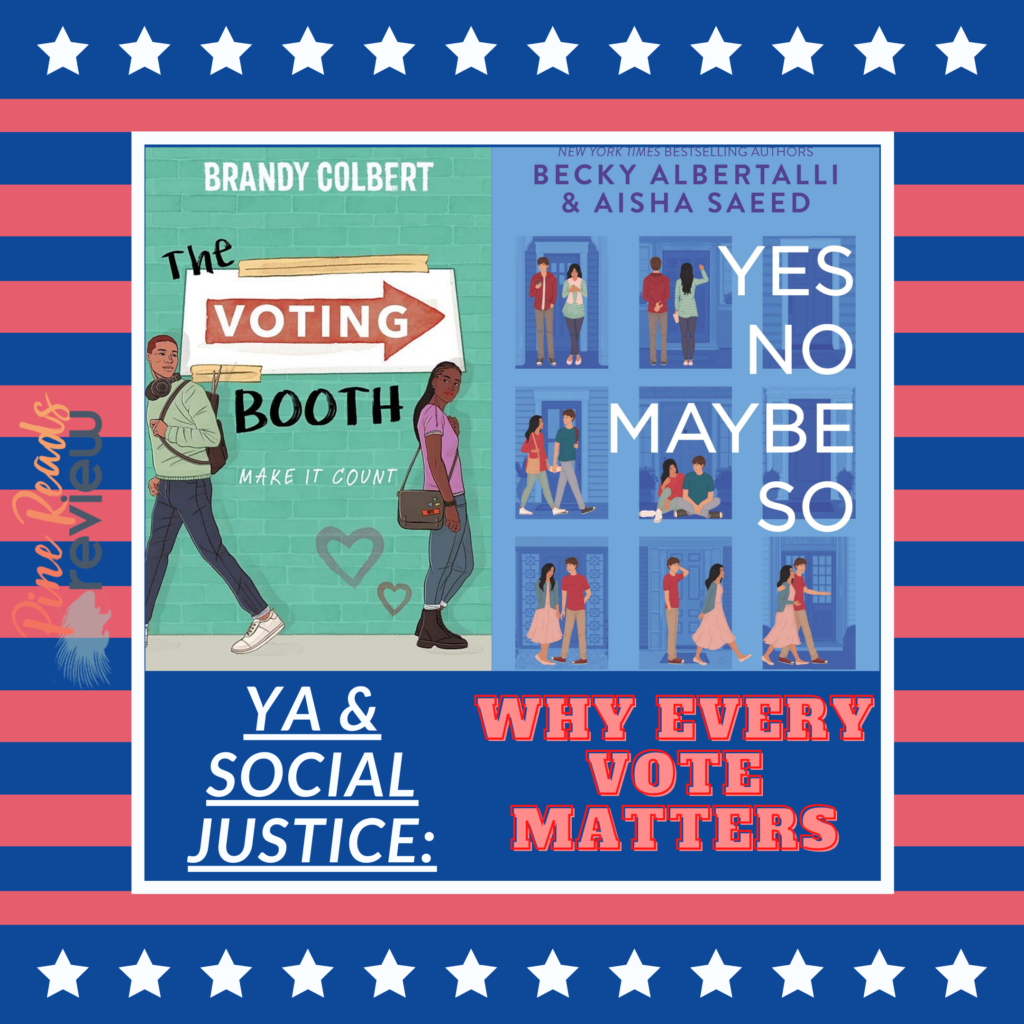
There is no doubt about it: the presidential election on November 3rd, 2020, is one of the most important elections in the history of the United States of America.
So much is at stake, from healthcare to immigration, from our environment to our equality, from science to truth. In our drastically changing and completely terrifying world of 2020, it often feels like we’re left without a voice in the political arena. However, even when it seems like the politicians will never listen to us, we do still have a way to make our voices heard: by voting.
And it’s more important than ever that we all vote in this election.
YA authors Becky Albertalli, Aisha Saeed, and Brandy Colbert do a phenomenal job in their novels of showing why all our voices matter, whether we’re old enough to vote or not. Even though young adult novels are marketed towards teenagers who might not be able to vote yet, it’s still very important that these stories get told to younger people, especially when social justice is concerned. And in Yes No Maybe So and The Voting Booth, social justice is definitely a concern.
Becky Albertalli and Aisha Saeed’s novel Yes No Maybe So tackles several different social justice issues. One of the protagonists, Maya, is Muslim while the other protagonist, Jamie, is Jewish. The book takes place over the span of the summer as they campaign for their local state senate candidate…and fall in love with each other along the way. But things aren’t at all easy for them. As Election Day gets closer and closer, Maya and Jamie face quite a few difficulties, including gas-lighting, racism, and anti-Semitism.
Despite all the challenges they face, Maya and Jamie begin to learn why political activism is so important and how they can make a difference in the election, even though they can’t vote yet. “After all,” Jamie points out, “there’s nothing quite like the futility of being seventeen in an election year.” He’s right when it comes to voting, but he’s also wrong. The biggest lesson that Jamie and Maya (and thereby, the readers) learn in this novel is that even if you aren’t old enough to vote (and even if you are) there is always a way to be politically active.
And in my case, this lesson worked. After finishing this book, I signed up to help campaign during the 2020 presidential election. In this era of social distancing, door-to-door canvassing isn’t really feasible, but texting and calling are. As Maya and Jamie find out in the book, volunteering might sometimes feel like you’re not making a difference, but we never know how our actions affect others. One text could make all the difference in a close race, and that text might have been sent by you.
Marva and Duke learn this lesson the hard way in Brandy Colbert’s brilliant novel, The Voting Booth. When Duke is turned away from his polling place on election day because of a mistake in registration, Marva decides to personally make sure that his vote gets counted. Through a whirlwind of events including a break-up, a missing Instagram-famous cat, family struggles, and an encounter with the police, Marva and Duke give us one example of how voting is so important, but how it can also be a struggle for some to even get to the polls.
As for social justice in this novel, both Marva and Duke are Black, and they both face racism throughout The Voting Booth. Marva explains the difficulties of dating a white boy while being one of the only Black students in a private school, and Duke points out the injustices of how he is treated by police. One of the most tense scenes in the novel is when Duke and Marva are stopped by a police officer. The first-person dual narration of both of them in this section really makes it clear exactly how unjust the system can be…and what we can do to change it. “This is why getting people out to vote is so important to me,” Marva says. “We shouldn’t still be dealing with this. We never should’ve had to deal with this…. I know voting doesn’t solve everything, and people may think one vote isn’t all that important, but I really believe it makes a difference.”
And I agree with her. After finishing this novel, I got onto my county website and signed up to work the polls on Election Day. It’s not a huge act of civil disobedience or even as visible as going to a protest for equality. But as Marva and Duke show us in this book, every single vote counts, and we can make a difference by helping even just one person to vote.
Duke and Marva organize their friends and family to drive the elderly to the polls. Maya and Jamie make an appointment and talk with one of their state representatives. There are things that we can do and actions that we can take to ensure that as many people as possible vote. One of the most important things that I learned in these two novels is how our actions affect others, even when we think it may not make a difference.
As November 3rd gets closer and closer, the most important thing that you can do to be politically active is to vote. Vote early, vote at the polls, vote for social justice, vote for the issues important to you, vote however you want and for whatever reason you want…but make sure that you vote. It’s a responsibility that we have as citizens of the United States, and it’s a right that we cannot take for granted. Your vote is your voice, so use it.
Every. Single. Vote. Matters.
Visit When We All Vote for more info.
PRR Writer, Wendy Waltrip